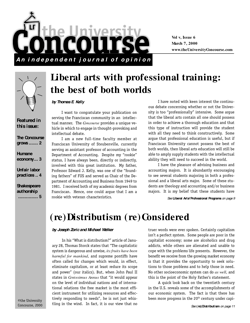Clarifying some points on unfair labor practices
by Michael Welker
John Cavanaugh-O’Keefe suggests that I doubt that unfair labor practices are widespread in Catholic organizations. But for me it is not an issue of doubt, it is a matter of exercising appropriate caution. It is too easy to commit the fallacy of assuming that what happens to an individual or a small number of individuals must be happening to many others. In my last article, I meant to stress that a few anecdotal cases of unfairness do not provide a sufficient basis for making general claims about labor practices in Catholic organizations. I do not doubt that unfairness exists. After all, Regina Schmiedicke—a highly trustworthy person—cites a number of convincing cases. However, in order to establish that systematic injustices are (or were) carried out, it is necessary to conduct a serious and scientific investigation using appropriate research methods.
In essence, Regina draws very large conclusion from a very small sample of the Catholic apostolate population. This is, to me, a weak way to attempt an effective call to change. I support attempts to alleviate injustices, but I worry about generalizations about many organizations that are trying to do the best they can with the means they possess. But more on that in a moment.
Second, I said that legal remedies exist. (Mr. O’Keefe is apparently pursuing such a remedy under the NLRB filing.) And I do believe that a Catholic who has been wrongfully harmed has a right and a need to access the legal system and seek redress—indeed to take even a charitable organization to court, if all other means of remedy have been exhausted.
Certainly, individual circumstances vary. I have a friend who has been severely damaged economically by a Catholic charity (in the name of that charity.) In his case, certain factors intervened to make other actions a reasonable response to the injustices. All this aside, however, a reasoned and appropriate response to injustice is always needed. The type of response, of course, varies. File with the NLRB, if you like. Bring the perpetrator to court. Pursue remedies on behalf of others, especially if “everybody knows” there is widespread injustice, e.g., unionize. However, the last remedy I mention, as I have said before, is not always the best solution (in fact, I do not think it is even close to a second-best solution).
Finally, I would like to add an appendix to my earlier comments. Even if persons do nothing but spread the word, as Regina and John are doing, about the sad state of affairs in certain Catholic workplaces, then we can expect that, overtime, the organizations should experience certain “market-based” punishments. Apostolates that gain a reputation for practicing acts of injustice (or creating or allowing the existence of any other unpleasant working conditions) should slowly experience a shrinking labor market base.
Eventually, these “Catholic entrepreneurs” will have to change their practices or increase wages (among other things) in order to reduce turnover and/or to attract a stable labor market. One serious problem still exists: imperfect information dominates. We know little about what organizations are committing acts of injustice. Therefore, I again ask for some clear, representative, and carefully prepared research on this extremely serious issue.
Michael Welker is Assistant Professor of Economics at FUS.


